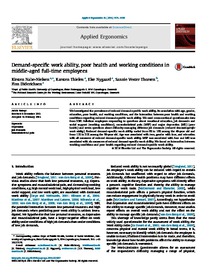Demand-specific work ability, poor health and working conditions in middle-aged full-time employees

Nabe-Nielsen, Kirsten ; Thielen, Karsten ; Nygaard, Else ; Diderichsen, Finn ; Vester Thorsen, Sannie
2014
45
4
1174-1180
ageing ; employability ; musculoskeletal diseases ; physical capacity ; working conditions ; work load
Ergonomics and work environment
http://dx.doi.org/10.1016/j.apergo.2014.02.007
English
Bibliogr.
"We investigated the prevalence of reduced demand-specific work ability, its association with age, gender, education, poor health, and working conditions, and the interaction between poor health and working conditions regarding reduced demand-specific work ability. We used cross-sectional questionnaire data from 3381 full-time employees responding to questions about vocational education, job demands and social support (working conditions), musculoskeletal pain (MSP) and major depression (MD) (poor health) and seven questions about difficulty managing different job demands (reduced demand-specific work ability). Reduced demand-specific work ability varied from 9% to 19% among the 46-year old and from 11% to 21% among the 56-year old. Age was associated with two, gender with four, and education with all measures of reduced demand-specific work ability. MSP was associated with four and MD was associated with six measures of reduced demand-specific work ability. We found no interaction between working conditions and poor health regarding reduced demand-specific work ability."
Digital
The ETUI is co-funded by the European Union. Views and opinions expressed are however those of the author(s) only and do not necessarily reflect those of the European Union or the ETUI.